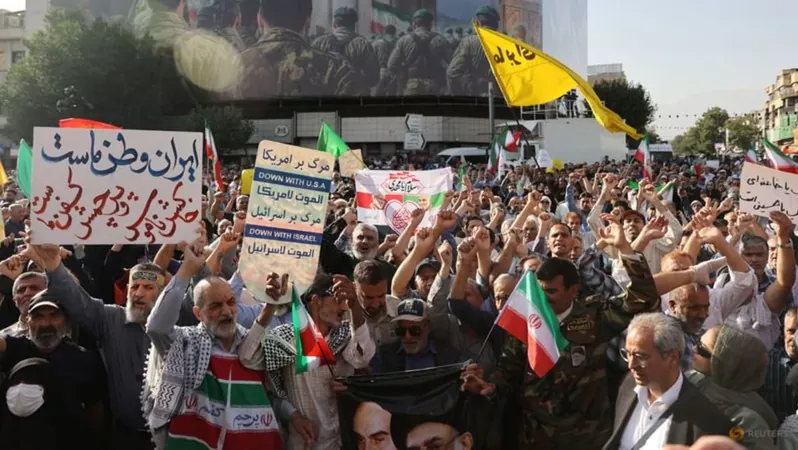
Iran's Next Move: What’s at Stake After US Strikes on Nuclear Sites?
2025-06-23
Author: Siti
On June 23, Iran condemned recent airstrikes by the United States on its nuclear facilities, warning that these actions could usher in a much larger conflict in the region.
Reacting to US President Donald Trump's triumphantly declared destruction of key sites in Fordow, Isfahan, and Natanz, experts predict that tensions are far from resolved. What will Iran do next?
Escalation or Retaliation?
The conflict intensified on June 13, when Israel launched strikes against Iranian military assets, prompting a series of retaliatory counterstrikes. The speed of the US response, called Operation Midnight Hammer, took many by surprise, involving 125 aircraft including stealth bombers arriving 18 hours after the order was given.
Political analysts question whether Trump's two-week timeline for further US action was a strategic ploy, suggesting possible cooperation between the US and Israel right from the start.
Iran’s Options: A Dangerous Balancing Act
In the wake of the strikes, Iranian officials have vowed retaliation. Potential responses may include targeting US military bases in the Middle East, increasing assaults on Israel, or even blocking the vital Strait of Hormuz, a crucial artery for global oil trade.
However, experts warn that military escalation would invite significant US retaliation, threatening to deepen the conflict further. Some strategists suggest Iran might choose to downplay damage to its nuclear assets as a cautionary approach.
High Stakes in a Volatile Region
Analysts like Amin Saikal highlight that an aggressive Iranian response could threaten global supply chains and provoke a political backlash against Trump, potentially curtailing his support for Israel's military actions.
Conversely, failing to retaliate may signal to the US that Iran is a soft target, possibly inviting further attacks.
Assessing Damage: How Effective Were the Strikes?
Despite Trump’s claims of total destruction at key Iranian sites, experts maintain that it’s difficult to assess the impact of the strikes accurately, as ground assessments are limited.
Some suggest that while Iranian missile capabilities may be temporarily diminished, the fundamental knowledge and resources to rebuild remain intact. Iran could swiftly recover from this setback and might even enhance its nuclear efforts in secrecy.
Can Diplomacy Prevail?
Calls for renewed negotiations between Iran and the US have been met with skepticism. Observers doubt that Iran will feel secure enough to engage after the US's withdrawal from the 2015 nuclear agreement, which aimed to restrict Iran's nuclear capabilities in exchange for sanctions relief.
With Iran's allies like Russia and China denouncing the US strikes, the geopolitical landscape is fraught with tension. Nonetheless, they may be hesitant to engage too directly to avoid escalating hostilities.
Final Thoughts: A Ticking Time Bomb?
As Iran weighs its options and the potential fallout of any military action, the stakes are undeniably high. The situation remains dangerously fluid, and Iran’s next steps will significantly shape the region's future. With the specter of a wider conflict looming, the world watches closely.




 Brasil (PT)
Brasil (PT)
 Canada (EN)
Canada (EN)
 Chile (ES)
Chile (ES)
 Česko (CS)
Česko (CS)
 대한민국 (KO)
대한민국 (KO)
 España (ES)
España (ES)
 France (FR)
France (FR)
 Hong Kong (EN)
Hong Kong (EN)
 Italia (IT)
Italia (IT)
 日本 (JA)
日本 (JA)
 Magyarország (HU)
Magyarország (HU)
 Norge (NO)
Norge (NO)
 Polska (PL)
Polska (PL)
 Schweiz (DE)
Schweiz (DE)
 Singapore (EN)
Singapore (EN)
 Sverige (SV)
Sverige (SV)
 Suomi (FI)
Suomi (FI)
 Türkiye (TR)
Türkiye (TR)
 الإمارات العربية المتحدة (AR)
الإمارات العربية المتحدة (AR)